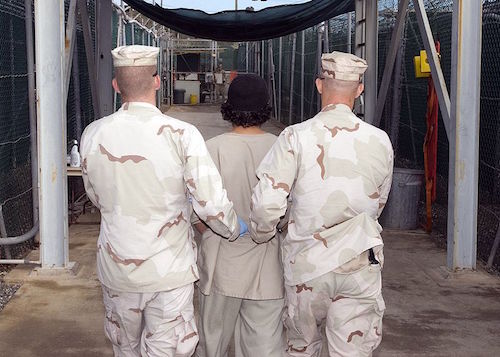 Culture & Ethics
Culture & Ethics
 Medicine
Medicine
From Guantanamo, a Bioethics Furor

The world of bioethics is aglow with righteous outrage that military doctors are ordered to help force-feed Guantanamo inmates who are on hunger strikes. I have written before that doing so is right and proper. These inmates do not have autonomy to the same extent as those not detained, and moreover, the force-feeding is done to maintain their health and welfare. It is not intended to inflict pain or coerce information from them — a different issue entirely.
Now, three bioethicists, writing in PLOS Medicine, have decried physician participation in force-feeding Guantanamo inmates. From the article:
Military physicians have been instructed that they can violate patient autonomy and traditional clinical loyalties to patients in order to facilitate force-feeding of hunger strikers, including through the use of restraint chairs, a practice that is never ethically acceptable and amounts to inhuman and degrading treatment
Does it? Says who? That’s right, other bioethicists — who are mostly of a particular port-leaning political tribe — and the international bodies they influence, like the WHO.
But that’s just their opinion. Force-feeding in this circumstance is completely lawful. Remember, these prisoners would suffer physical harm, perhaps death, if allowed to starve themselves. If they want not to be force-fed, all they have to do is eat.
The article is part of a political move. Many bioethicists not only want doctors to be forbidden by ethics rules from force-feeding, but also want doctors to be allowed to facilitate a prisoner hunger strike by ameliorating the discomfort, thereby allowing it to go on longer. That’s political. That’s taking a side.
I find it interesting — and ironic — that most bioethicists of this strip also support doctors participating in euthanasia and assisted suicide. (I don’t know the position of these particular authors on the issue.) In other words, many bioethicists oppose actions by doctors to keep prisoners from inflicting self-harm, but support medical assistance in killing other categories of people.
The authors also call for a conscience clause for military doctors who don’t want to participate. I tend to support conscience rights for physicians, although by joining the military, doctors agree to follow all lawful orders.
This is key: Despite several efforts, no court has found force-feeding in this context to be unlawful. The military can hardly be expected to allow its members to refuse lawful orders. I would also note that bioethics discourse — generally, not universally — opposes conscience protections for civilian doctors around life-taking procedures such as abortion.
Finally, a question: Guantanamo hunger strikers are going to be force-fed once their health and lives are endangered. That being so, why wouldn’t bioethicists want doctors to participate to ensure the feeding — that will be done — is accomplished with as little discomfort and risk to the inmate as possible?
Image credit: Navy Petty Officer 1st Class Michael Billings [Public domain or Public domain], via Wikimedia Commons.
